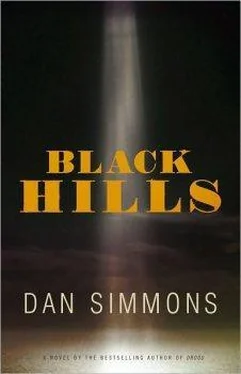Early the next morning, as he eats, Paha Sapa watches a line of still-nursing mothers bring their babies to lay them at the base of the now-transformed waga chun. These boy babies will now grow up to be brave men and the girl babies will be mothers of brave men. Limps-a-Lot and the other wičasa wakans sit around the circle throughout the morning, piercing the ears of these babies. The parents of each baby so honored are expected to give away a pony to someone in need of one.
All that day, Sitting Bull and the other warriors involved in the Sun Dance purify themselves in sweat lodges and make ready for the important work to begin the following morning. During the preceding year—especially during the winter when food was scarce or loved ones were sick—many of the men and women gathered here took private vows to sacrifice at the sacred tree. Others preparing here are the boys, some not many months older than Paha Sapa, who will be dancing as part of their manhood ceremony.
The sacrifices will include slashing at one’s arms or chest, or cutting squares of flesh from the same areas, or perhaps cutting off one’s finger. But the most serious sacrificers here will undergo the full piercing ceremony and dance before the pole.
Thousands of Lakota have now arrived for the ceremony. The prairie near the Deer Medicine Rocks and on both sides of the Rosebud are bright with evening fires and glowing lodges.
The night before the dance begins, Limps-a-Lot takes Paha Sapa to visit Sitting Bull.
Even by the flickering light of Sitting Bull’s small lodge fire, Paha Sapa can see that the man has been preparing for the ritual, which—according to Limps-a-Lot—Sitting Bull has performed many times since he was a boy dancing into manhood at his manhood ceremony. Several days before this, Sitting Bull washed off all paint, removed his feathers from his hair, and loosened his braids. Paha Sapa can see from his slow movements and slight air of weakness that Sitting Bull has been fasting. Still, the chief offers Limps-a-Lot smoke from his pipe after Paha Sapa has been introduced and as the two men talk about old memories. Sitting Bull’s voice is low, his pace unhurried, when he finally turns his attention to Paha Sapa.
— My friend Limps-a-Lot tells me that Wakan Tanka may have granted you the ability to see into human beings’ past or future, Black Hills.
Paha Sapa’s heart pounds. He can only manage a nod. Sitting Bull’s eyes are luminous and piercing.
— I can also see into the future at times, little Black Hills, but I am granted a Vision only after much pain and effort and sacrifice. You have not had your hanblečeya yet, have you, boy?”
— No , Ate.
The Ate —Father—is a term of respect.
Sitting Bull nods slowly, looks at Limps-a-Lot, and then returns his strong gaze to Paha Sapa’s face across the fire.
— Then these little visions you have had are not a true Vision. It may be some ability in you, given to you by the spirits or by Wakan Tanka, or they may be tricks done to you by some power that does not love the Natural Free Human Beings. Be very careful, little Black Hills, about trusting in these visions-which-are-not-a-Vision.
Again, all Paha Sapa can do is nod.
— You may know where these things come from when you perform your real hanblečeya.
Sitting Bull looks at Limps-a-Lot and there is a question in his eye. Limps-a-Lot says—
— We thought perhaps next summer, when the whole band will be near the Black Hills again. It seems right that Paha Sapa does his hanblečeya there because of the circumstances of his birth, but the band is now far from Bear Butte and the Hills, and it would be a dangerous time for the boy of ten or eleven summers to travel alone.
Sitting Bull grunts.
— That is true. Long Hair and his wasichu horse soldiers are on the march, as are General Crook and others. A boy traveling alone on the plains or with only his adoptive tunkašila would run a great risk of being captured or killed—especially if we have a big fight here along the Rosebud or Little Big Horn, as I hope we will, and if we kill many Wasicun. The other wasichu will want blood. But, Limps-a-Lot, I think you should send Black Hills on his hanblečeya sooner than next summer. Much sooner. No later than the Moon of the Colored Leaves or the Moon of the Falling Leaves. This… gift… of his may be dangerous. And not only to the boy. He needs a Vision, if the Father or Six Grandfathers will grant him one.
Limps-a-Lot only grunts noncommittally. Sitting Bull leans toward the fire and Paha Sapa.
— Black Hills, I apologize for speaking about you as if you were not here. We old men do that sometimes when the young are about. Did you want to touch me to see if your small-looking-back-vision or small-looking-forward-vision works with me?
Paha Sapa is silent for a long moment. Then, through trembling lips, he says—
— No. Pilamaye, Ate.
He does not know why he added the “thank you.”
Sitting Bull smiles.
—Washtay! Good. I would not have let you touch me for such a vision. Not on the night before my own Dance.
Sitting Bull swivels toward Limps-a-Lot and grasps his forearm.
— I am fasting, so I will not partake, but before you go, my friend, you and your grandchild will enjoy some hot pejuta sapa. I found it on the body of a dead Wasicun only last week and I had my wife grind it tonight. And then we shall smoke together .
Paha Sapa’s eyes grow wide. Pejuta sapa —“black medicine,” coffee—is one of the most magical drinks ever taken from the wasichu , second only in its power to mni waken , holy water, whiskey.
While Sitting Bull prepares the pipe, Paha Sapa drinks his cup of the pejuta sapa , sipping only when his tunkašila sips (out of fear that there may be some aspect to the ritual drinking of which he is ignorant). Paha Sapa has never tasted anything so strong and so black and so bitter and so wonderful.
Afterward, Sitting Bull and Limps-a-Lot smoke the special pipe—it is precisely the Ptehinčala Huhu Canunpa , the sacred Buffalo Calf Bone Pipe, used earlier in the preparing-the-tree ritual—long into the night.
At one point, when Sitting Bull has stepped out of the lodge to piss into the high grass, Paha Sapa whispers to his grandfather—
— Can you just smoke this pipe as if it were… a pipe?
Before Limps-a-Lot can answer, Sitting Bull replies from the darkness at the opening of the tipi, where he is tucking himself in.
— Yuhaxcan cannonpa, el woilagyape lo. Ehantan najin oyate maka sitomniyan cannonpa kin he unywakanpelo.
It is used for doing all things. Ever since the standing people have been all over the earth, the pipe has been wakan .
Then Sitting Bull adds—
— And it is the best pipe I own for smoking tobacco.
When they are finally finished and Limps-a-Lot and Paha Sapa both rise and step out into the smoke-smelling sweet darkness to go back to their own lodge—Paha Sapa does not feel the least bit sleepy—Sitting Bull steps outside with them and touches Paha Sapa on the shoulder, gingerly, with the curved end of his old coup stick.
— Come watch my Dance tomorrow, Black Hills. Watch and learn how to ask Wakan Tanka and all the spirits for a real vision.
—Han, Ate.
Then Sitting Bull taps him lightly and says softly, in a singsong voice—
— Toksha ake čante ista wacinyanktin ktelo, Paha Sapa.
I shall see you again with the eye of my heart, Black Hills.
Читать дальше












